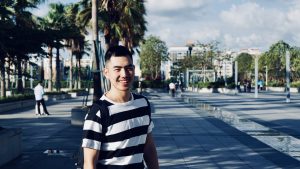Hao is a part-time student on the MSc in Applied Linguistics for Language Teaching course. He juggles his studies with his role as an applied linguistics researcher and EAP lecturer at a “211 Project” university in Shanghai, China. Before studying at the department, he completed a Master’s degree in Teaching English to Speakers of Other Languages from The University of Hong Kong (China) and a Bachelor’s degree in English Language and Literature from University of Science and Technology Liaoning (China).
What do you hope to go on to do once you’ve completed your postgraduate degree? What do you hope to achieve?
I will continue my career in English teaching and applied linguistics research in the university setting. This program gave me a substantial amount of inspiration for curriculum design and teaching methodology. I have been applying them in updating my teaching plans and teaching practice. Moreover, I hope to continue my research in psychometrics in English learning motivation and Chinese students’ second language acquisition.
What do you most value about the teaching at the department?
Compared with the full-time residential students, we have more flexibility to control the learning pace. Weekends are usually the time when I can examine the learning materials. Moreover, I have to say all professors, tutors, librarians, and administrative staff are supportive and helpful, which is far beyond my expectations. Regarding the course design, in each module, they post interesting and inspiring questions stimulating our reflection upon our own teaching practice. Also, they devote plenty of time to giving comment and feedback on our work. As a teacher myself, I understand how much time they spend in giving the individualized feedback on our submissions. I usually go back to the Canvas forum to read the comments from the tutors and my peers.
Why do you think it’s important to study education?
Studying education gives me a chance to contemplate upon my own learning process so that I can more effectively teach my students. Studying education also allows me to be a critical thinker, who is willing to find what teaching approach is most appropriate for my students from copious research studies.
What advice would you give to new postgraduate students on how they can get involved in the department community?
The course, especially the weekly readings, is demanding, but it gives back a lot in return. I would advise new postgraduate students to have some knowledge of basic statistics before entering the program. It would facilitate finishing the weekly assignments.
Did you receive any financial help through the University and if so what was it?
I received a £250 research support grant from Kellogg College. I used the grant to recruit volunteering participants for my graduation thesis.

